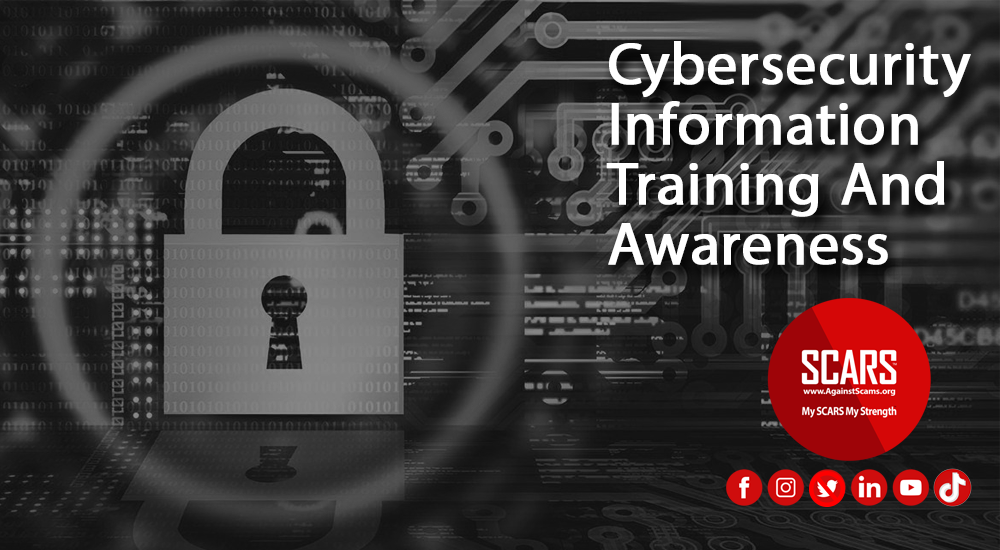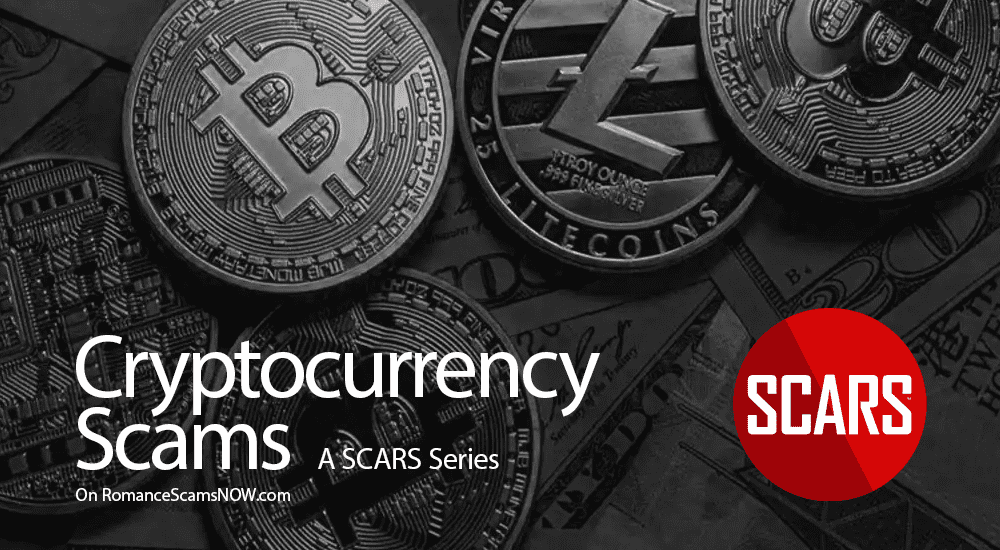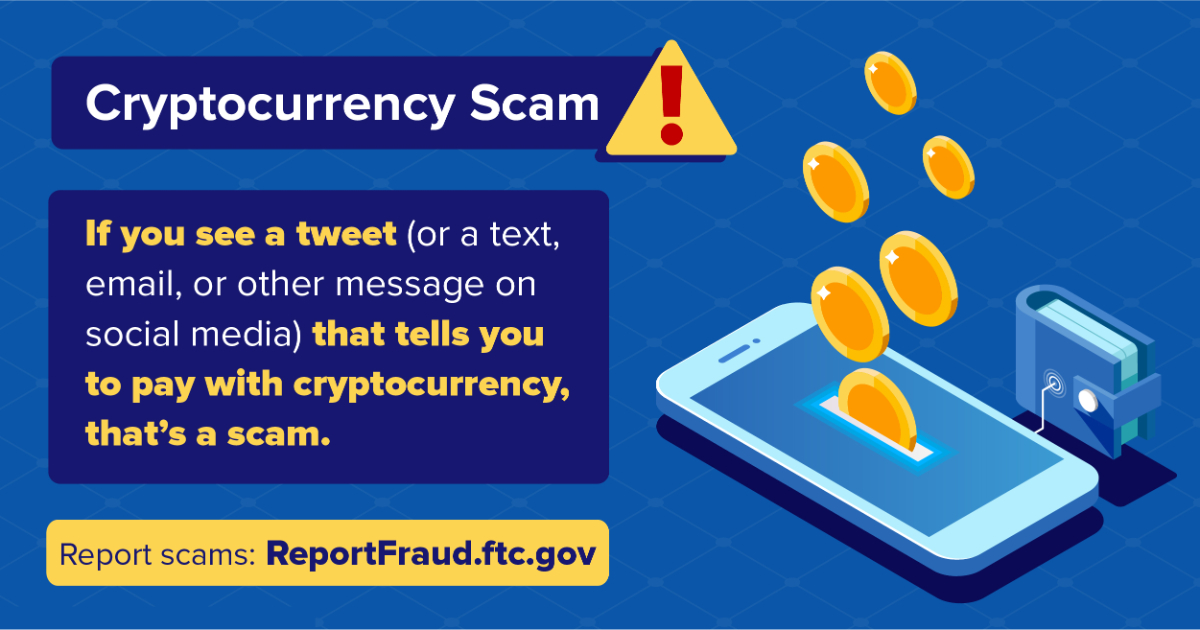
SCARS Institute’s Encyclopedia of Scams™ Published Continuously for 25 Years

What To Know About Cryptocurrency and Scams
What To Know About Cryptocurrency? Are you confused about cryptocurrencies, like bitcoin or Ether (associated with Ethereum)?
You’re not alone. Before you use or invest in cryptocurrency, know what makes it different from cash and other payment methods, and how to spot cryptocurrency scams or detect cryptocurrency accounts that may be compromised.
What is cryptocurrency?
Cryptocurrency is a type of digital currency that generally exists only electronically. You usually use your phone, computer, or a cryptocurrency ATM to buy cryptocurrency. Bitcoin and Ether are well-known cryptocurrencies, but there are many different cryptocurrencies, and new ones keep being created.
How do people use cryptocurrency?
People use cryptocurrency for many reasons — quick payments, to avoid transaction fees that traditional banks charge, or because it offers some anonymity. Others hold cryptocurrency as an investment, hoping the value goes up.
How do you get cryptocurrency?
You can buy cryptocurrency through an exchange, an app, a website, or a cryptocurrency ATM. Some people earn cryptocurrency through a complex process called “mining,” which requires advanced computer equipment to solve highly complicated math puzzles.
Where and how do you store cryptocurrency?
Cryptocurrency is stored in a digital wallet, which can be online, on your computer, or on an external hard drive. A digital wallet has a wallet address, which is usually a long string of numbers and letters. If something happens to your wallet or your cryptocurrency funds — like your online exchange platform goes out of business, you send cryptocurrency to the wrong person, you lose the password to your digital wallet, or your digital wallet is stolen or compromised — you’re likely to find that no one can step in to help you recover your funds.
How is cryptocurrency different from U.S. Dollars?
Because cryptocurrency exists only online, there are important differences between cryptocurrency and traditional currency, like U.S. dollars.
- Cryptocurrency accounts are not backed by a government. Cryptocurrency held in accounts is not insured by a government like U.S. dollars deposited into an FDIC insured bank account. If something happens to your account or cryptocurrency funds — for example, the company that provides storage for your wallet goes out of business or is hacked — the government has no obligation to step in and help get your money back.
- Cryptocurrency values change constantly. The value of a cryptocurrency can change rapidly, even changing by the hour. And the amount of the change can be significant. It depends on many factors, including supply and demand. Cryptocurrencies tend to be more volatile than more traditional investments, such as stocks and bonds. An investment that’s worth thousands of dollars today might be worth only hundreds tomorrow. And, if the value goes down, there’s no guarantee it will go up again.
Paying With Cryptocurrency?
There are many ways that paying with cryptocurrency is different from paying with a credit card or other traditional payment methods.
- Cryptocurrency payments do not come with legal protections. Credit cards and debit cards have legal protections if something goes wrong. For example, if you need to dispute a purchase, your credit card company has a process to help you get your money back. Cryptocurrencies typically do not come with any such protections.
- Cryptocurrency payments typically are not reversible. Once you pay with cryptocurrency, you can usually only get your money back if the person you paid sends it back. Before you buy something with cryptocurrency, know the seller’s reputation, by doing some research before you pay.
Some information about your transactions will likely be public. People talk about cryptocurrency transactions as anonymous. But the truth is not that simple.
Cryptocurrency transactions will typically be recorded on a public ledger, called a “blockchain.” That’s a public list of every cryptocurrency transaction — both on the payment and receipt sides. Depending on the blockchain, the information added to the blockchain can include details like the transaction amount, as well as the sender’s and recipient’s wallet addresses. It’s sometimes possible to use transaction and wallet information to identify the people involved in a specific transaction. And when you buy something from a seller who collects other information about you, like a shipping address, that information can also be used to identify you later on.
How To Avoid Cryptocurrency Scams
Scammers are always finding new ways to steal your money using cryptocurrency. To steer clear of a crypto con, here are some things to know.
- Only scammers demand payment in cryptocurrency. No legitimate business is going to demand you send cryptocurrency in advance – not to buy something, and not to protect your money. That’s always a scam.
- Only scammers will guarantee profits or big returns. Don’t trust people who promise you can quickly and easily make money in the crypto markets.
- Never mix online dating and investment advice. If you meet someone on a dating site or app, and they want to show you how to invest in crypto, or asks you to send them crypto, that’s a scam.
Spot crypto-related scams
Scammers are using some tried and true scam tactics — only now they’re demanding payment in cryptocurrency. Investment scams are one of the top ways scammers trick you into buying cryptocurrency and sending it on to scammers. But scammers are also impersonating businesses, government agencies, and a love interest, among other tactics.
Cryptocurrency Scam Types
Investment Scams/Pig Butchering Scams
Investment scams often promise you can “make lots of money” with “zero risk,” and often start on social media or online dating apps or sites. These scams can, of course, start with an unexpected text, email, or call, too. And, with investment scams, crypto is central in two ways: it can be both the investment and the payment.
Here are some common investment scams, and how to spot them.
- A so-called “investment manager” contacts you out of the blue. They promise to grow your money — but only if you buy cryptocurrency and transfer it into their online account. The investment website they steer you to looks real, but it’s really fake, and so are their promises. If you log in to your “investment account,” you won’t be able to withdraw your money at all, or only if you pay high fees.
- A scammer pretends to be a celebrity who can multiply any cryptocurrency you send them. But celebrities aren’t contacting you through social media. It’s a scammer. And if you click on an unexpected link they send or send cryptocurrency to a so-called celebrity’s QR code, that money will go straight to a scammer and it’ll be gone.
- An online “love interest” wants you to send money or cryptocurrency to help you invest. That’s a scam. As soon as someone you meet on a dating site or app asks you for money, or offers you investment advice, know this: that’s a scammer. The advice and offers to help you invest in cryptocurrency are nothing but scams. If you send them crypto, or money of any kind, it’ll be gone, and you typically won’t get it back.
- Scammers guarantee that you’ll make money or promise big payouts with guaranteed returns. Nobody can make those guarantees. Much less in a short time. And there’s nothing “low risk” about cryptocurrency investments. So: if a company or person promises you’ll make a profit, that’s a scam. Even if there’s a celebrity endorsement or testimonials from happy investors. Those are easily faked.
- Scammers promise free money. They’ll promise free cash or cryptocurrency, but free money promises are always fake.
- Scammers make big claims without details or explanations. No matter what the investment, find out how it works and ask questions about where your money is going. Honest investment managers or advisors want to share that information and will back it up with details.
Before you invest in crypto, search online for the name of the company or person and the cryptocurrency name, plus words like “review,” “scam,” or “complaint.” See what others are saying. And read more about other common investment scams.
Business, Government, and Job Impersonator Scams
In a business, government, or job impersonator scam, the scammer pretends to be someone you trust to convince you to send them money by buying and sending cryptocurrency.
- Scammers impersonate well-known companies. These come in waves, and scammers might say they’re from Amazon, Microsoft, FedEx, your bank, or many others. They’ll text, call, email, or send messages on social media — or maybe put a pop-up alert on your computer. They might say there’s fraud on your account, or your money is at risk — and to fix it, you need to buy crypto and send it to them. But that’s a scam. If you click the link in any message, answer the call, or call back the number on the pop-up, you’ll be connected to a scammer.
- Scammers impersonate new or established businesses offering fraudulent crypto coins or tokens. They’ll say the company is entering the crypto world by issuing their own coin or token. They might create social media ads, news articles or a slick website to back it all up and trick people into buying. But these crypto coins and tokens are a scam that ends up stealing money from the people who buy them. Research online to find out whether a company has issued a coin or token. It will be widely reported in established media if it is true.
- Scammers impersonate government agencies, law enforcement, or utility companies. They might say there’s a legal problem, that you owe money, or your accounts or benefits are frozen as part of an investigation. They tell you to solve the problem or protect your money by buying cryptocurrency. They might say to send it to a wallet address they give you — for “safe keeping.” Some scammers even stay on the phone with you as they direct you to a cryptocurrency ATM and give step-by-step instruction on how to insert money and convert it to cryptocurrency. They’ll direct you to send the crypto by scanning a QR code they give you, which directs the payment right into their digital wallet — and then it’s gone.
- Scammers list fake jobs on job sites. They might even send unsolicited job offers related to crypto like jobs helping recruit investors, selling or mining cryptocurrency, or helping convert cash to crypto. But these so-called “jobs” only start if you pay a fee in cryptocurrency. Which is always a scam, every time. As your first task in your “job,” these scammers send you a check to deposit into your bank account. (That check will turn out to be fake.) They’ll tell you to withdraw some of that money, buy cryptocurrency for a made-up “client,” and send it to a crypto account they give you. But if you do, the money will be gone, and you’ll be on the hook to repay that money to your bank.
To avoid business, government, and job impersonators, know that
- No legitimate business or government will ever email, text, or message you on social media to ask for money. And they will never demand that you buy or pay with cryptocurrency.
- Never click on a link from an unexpected text, email, or social media message, even if it seems to come from a company you know.
- Don’t pay anyone who contacts you unexpectedly, demanding payment with cryptocurrency.
- Never pay a fee to get a job. If someone asks you to pay upfront for a job or says to buy cryptocurrency as part of your job, it’s a scam.
Blackmail/Sextortion/Extortion Scams
Scammers might send emails or U.S. mail to your home saying they have embarrassing or compromising photos, videos, or personal information about you. Then, they threaten to make it public unless you pay them in cryptocurrency. Don’t do it. This is blackmail and a criminal extortion attempt. Report it to the FBI immediately – go to reporting.AgainstScams.org to learn more.
More:
- Scams and Cryptocurrency Go Hand in Hand (scamsnow.com)
- 2023 BIG Cryptocurrency Investigator’s Handbook (romancescamsnow.com)
- Reporting Scams To The United States Secret Service – Cryptocurrency Recovery – Forget The FBI! [VIDEO] (romancescamsnow.com)
- Can The Police Trace Cryptocurrency & Recover It? (romancescamsnow.com)
- Airdrop Cryptocurrency Attack or Scam (romancescamsnow.com)
- Cryptocurrency Money Laundering – Cybercrime/Scam Basics (romancescamsnow.com)
- Cryptocurrency/Bitcoin Payment Warning (romancescamsnow.com)
- Crypto Dusting Attack – Another Cryptocurrency Scam (romancescamsnow.com)
- Cryptocurrency Enforcement – The Report Of The U.S. Attorney General’s Cyber Digital Task Force (romancescamsnow.com)
- Scam Warning: New Type Of Crypto Investment Scam – Liquidity Mining Crypto Scam (romancescamsnow.com)
- The 4 Myths Of Criminal Use Of Cryptocurrencies (romancescamsnow.com)
- New Crypto Payment Scam – A SCARS Alert (romancescamsnow.com)
-/ 30 /-
What do you think about this?
Please share your thoughts in a comment below!
LEAVE A COMMENT?
Recent Comments
On Other Articles
- Arwyn Lautenschlager on Love Bombing And How Romance Scam Victims Are Forced To Feel: “I was love bombed to the point that I would do just about anything for the scammer(s). I was told…” Feb 11, 14:24
- on Dani Daniels (Kira Lee Orsag): Another Scammer’s Favorite: “You provide a valuable service! I wish more people knew about it!” Feb 10, 15:05
- on Danielle Delaunay/Danielle Genevieve – Stolen Identity/Stolen Photos – Impersonation Victim UPDATED 2024: “We highly recommend that you simply turn away form the scam and scammers, and focus on the development of a…” Feb 4, 19:47
- on The Art Of Deception: The Fundamental Principals Of Successful Deceptions – 2024: “I experienced many of the deceptive tactics that romance scammers use. I was told various stories of hardship and why…” Feb 4, 15:27
- on Danielle Delaunay/Danielle Genevieve – Stolen Identity/Stolen Photos – Impersonation Victim UPDATED 2024: “Yes, I’m in that exact situation also. “Danielle” has seriously scammed me for 3 years now. “She” (he) doesn’t know…” Feb 4, 14:58
- on An Essay on Justice and Money Recovery – 2026: “you are so right I accidentally clicked on online justice I signed an agreement for 12k upfront but cd only…” Feb 3, 08:16
- on The SCARS Institute Top 50 Celebrity Impersonation Scams – 2025: “Quora has had visits from scammers pretending to be Keanu Reeves and Paul McCartney in 2025 and 2026.” Jan 27, 17:45
- on Scam Victims Should Limit Their Exposure To Scam News & Scammer Photos: “I used to look at scammers photos all the time; however, I don’t feel the need to do it anymore.…” Jan 26, 23:19
- on After A Scam, No One Can Tell You How You Will React: “This article was very informative, my scams happened 5 years ago; however, l do remember several of those emotions and/or…” Jan 23, 17:17
- on Situational Awareness and How Trauma Makes Scam Victims Less Safe – 2024: “I need to be more observant and I am practicing situational awareness. I’m saving this article to remind me of…” Jan 21, 22:55
ARTICLE META
Important Information for New Scam Victims
- Please visit www.ScamVictimsSupport.org – a SCARS Website for New Scam Victims & Sextortion Victims
- Enroll in FREE SCARS Scam Survivor’s School now at www.SCARSeducation.org
- Please visit www.ScamPsychology.org – to more fully understand the psychological concepts involved in scams and scam victim recovery
If you are looking for local trauma counselors please visit counseling.AgainstScams.org or join SCARS for our counseling/therapy benefit: membership.AgainstScams.org
If you need to speak with someone now, you can dial 988 or find phone numbers for crisis hotlines all around the world here: www.opencounseling.com/suicide-hotlines
A Note About Labeling!
We often use the term ‘scam victim’ in our articles, but this is a convenience to help those searching for information in search engines like Google. It is just a convenience and has no deeper meaning. If you have come through such an experience, YOU are a Survivor! It was not your fault. You are not alone! Axios!
A Question of Trust
At the SCARS Institute, we invite you to do your own research on the topics we speak about and publish, Our team investigates the subject being discussed, especially when it comes to understanding the scam victims-survivors experience. You can do Google searches but in many cases, you will have to wade through scientific papers and studies. However, remember that biases and perspectives matter and influence the outcome. Regardless, we encourage you to explore these topics as thoroughly as you can for your own awareness.
Statement About Victim Blaming
SCARS Institute articles examine different aspects of the scam victim experience, as well as those who may have been secondary victims. This work focuses on understanding victimization through the science of victimology, including common psychological and behavioral responses. The purpose is to help victims and survivors understand why these crimes occurred, reduce shame and self-blame, strengthen recovery programs and victim opportunities, and lower the risk of future victimization.
At times, these discussions may sound uncomfortable, overwhelming, or may be mistaken for blame. They are not. Scam victims are never blamed. Our goal is to explain the mechanisms of deception and the human responses that scammers exploit, and the processes that occur after the scam ends, so victims can better understand what happened to them and why it felt convincing at the time, and what the path looks like going forward.
Articles that address the psychology, neurology, physiology, and other characteristics of scams and the victim experience recognize that all people share cognitive and emotional traits that can be manipulated under the right conditions. These characteristics are not flaws. They are normal human functions that criminals deliberately exploit. Victims typically have little awareness of these mechanisms while a scam is unfolding and a very limited ability to control them. Awareness often comes only after the harm has occurred.
By explaining these processes, these articles help victims make sense of their experiences, understand common post-scam reactions, and identify ways to protect themselves moving forward. This knowledge supports recovery by replacing confusion and self-blame with clarity, context, and self-compassion.
Additional educational material on these topics is available at ScamPsychology.org – ScamsNOW.com and other SCARS Institute websites.
Psychology Disclaimer:
All articles about psychology and the human brain on this website are for information & education only
The information provided in this article is intended for educational and self-help purposes only and should not be construed as a substitute for professional therapy or counseling.
While any self-help techniques outlined herein may be beneficial for scam victims seeking to recover from their experience and move towards recovery, it is important to consult with a qualified mental health professional before initiating any course of action. Each individual’s experience and needs are unique, and what works for one person may not be suitable for another.
Additionally, any approach may not be appropriate for individuals with certain pre-existing mental health conditions or trauma histories. It is advisable to seek guidance from a licensed therapist or counselor who can provide personalized support, guidance, and treatment tailored to your specific needs.
If you are experiencing significant distress or emotional difficulties related to a scam or other traumatic event, please consult your doctor or mental health provider for appropriate care and support.
Also read our SCARS Institute Statement about Professional Care for Scam Victims – click here to go to our ScamsNOW.com website.

















Thank you for your comment. You may receive an email to follow up. We never share your data with marketers.